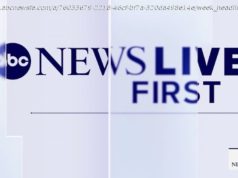Scotland’s first minister says she will ask for permission to hold a second vote on independence.
Nicola Sturgeon has confirmed she will ask for permission to hold a second referendum on Scottish independence.
Ms Sturgeon said she wanted a vote to be held between the autumn of 2018 and the spring of the following year.
The Scottish first minister said the move was needed to protect Scottish interests in the wake of the UK voting to leave the EU.
She said she would ask the Scottish Parliament next week to request a Section 30 order from Westminster.
The order would be needed to allow a fresh legally-binding referendum on independence to be held.
Prime Minister Theresa May has so far avoided saying whether or not she would grant permission.
Her official spokesman responded to Ms Sturgeon’s announcement by saying that the evidence „clearly showed a majority of people in Scotland do not want a second independence referendum“.
He added: „Only a little over two years ago people in Scotland voted decisively to remain part of our United Kingdom in a referendum which the Scottish government defined as a ‚once in a generation‘ vote.
„Another referendum would be divisive and cause huge economic uncertainty at the worst possible time“.
But speaking at her official Bute House residence in Edinburgh, Ms Sturgeon said the people of Scotland must be offered a choice between a „hard Brexit“ and becoming an independent country.
The Scottish government has published proposals which it says would allow Scotland to remain a member of the European single market even if the rest of the UK leaves, which Mrs May has said it will.
Game on. Next week Nicola Sturgeon will go to Holyrood seeking a Section 30 order for „indyref2“.
This part, at least, should be pretty simple. There is a pro-independence majority at Holyrood; the Greens should back the SNP, so Holyrood should return a call for a second referendum.
Will the UK government give permission? Technically, they could say no. But politically, it might be very difficult for them to refuse outright.
The real battle here may not be over whether there is a referendum, but when.
Ms Sturgeon is clear she wants the vote to take place before Brexit is complete, in the spring of 2019.
The UK government may well argue it should take place after that, so there can be full focus on the tricky task of Brexit itself.
There remains a lot of detail to be hammered out before we get back on the campaign trail.
Follow @BBCPhilipSim on Twitter
The first minister said the UK government had not „moved even an inch in pursuit of compromise and agreement“ since the Brexit referendum, which saw Scotland vote by 62% to 38% in favour of Remain while the UK as a whole voted to leave by 52% to 48%.
The EU Withdrawal Bill is widely expected to complete its final stages in the UK Parliament later on Monday , which would allow Mrs May to then trigger Article 50 – which formally starts the Brexit process – as early as Tuesday.
Ms Sturgeon said Scotland stood at a „hugely important crossroads“, and insisted she would continue to attempt to reach a compromise with the UK government.
But she added: „I will take the steps necessary now to make sure that Scotland will have a choice at the end of this process.
„A choice of whether to follow the UK to a hard Brexit, or to become an independent country able to secure a real partnership of equals with the rest of the UK and our own relationship with Europe. “
Ms Sturgeon continued: „The Scottish government’s mandate for offering this choice is beyond doubt.
„So next week I will seek the approval of the Scottish Parliament to open discussions with the UK government on the details of a Section 30 order – the procedure that will enable the Scottish Parliament to legislate for an independence referendum. “
Ms Sturgeon said it was „important that Scotland is able to exercise the right to choose our own future at a time when the options are clearer than they are now, but before it is too late to decide on our own path. “
She said that the detailed arrangements for a referendum – including its timing – should be for the Scottish Parliament to decide.
But she said it was important to be „frank about the challenges we face and clear about the opportunities independence will give us to secure our relationship with Europe, build a stronger and more sustainable economy and create a fairer society. “
Nicola Sturgeon’s view is that she has been backed into a corner.
In part she has almost backed herself into a corner by her rhetoric over the last few weeks and months.
She has left herself very little room for manoeuvre unless Theresa May is going to offer her up this deal of Scotland remaining a part of the single market.
At the same time, she has fuelled a level of expectation within her own party. Many within the SNP are pushing her to go for the second independence referendum.
You could argue that maybe she cannot hold back any longer, and therefore has decided to seize the initiative, go out on the front foot, lay down the gauntlet to Theresa May and say „OK, I’m asking for the referendum, will you give it to me? “
Ms Sturgeon will rely on the pro-independence Scottish Greens to give her plans majority support in the Scottish Parliament.
Patrick Harvie, the party’s co-convener, welcomed the announcement and confirmed the Greens would vote in favour of seeking a Section 30 order.
He added: „Scotland’s votes and our voice have been ignored by a Tory government at Westminster which we did not vote for and a feeble Labour opposition.
„The people of Scotland deserve a choice between Hard Brexit Britain and putting our own future in our own hands“.
But Scottish Conservative leader Ruth Davidson said Ms Sturgeon had been „utterly irresponsible“ and had „given up acting as first minister for all of Scotland“.
Ms Davidson added: „People have said time and again they do not want to go back to the division of a second referendum.
„Nicola Sturgeon promised the 2014 referendum would be ‚once in a generation‘.
„Today she has ignored the majority in Scotland who do not want a referendum and has decided instead to double down on division and uncertainty.






